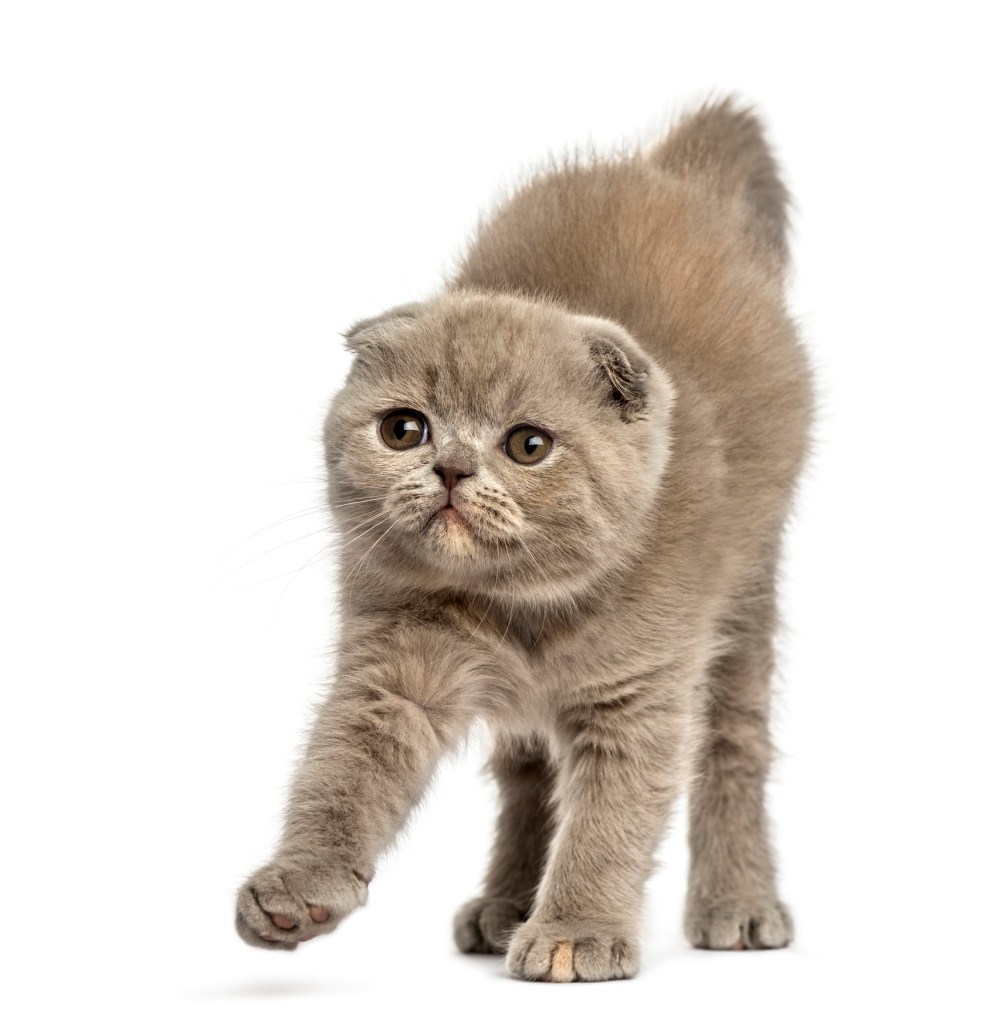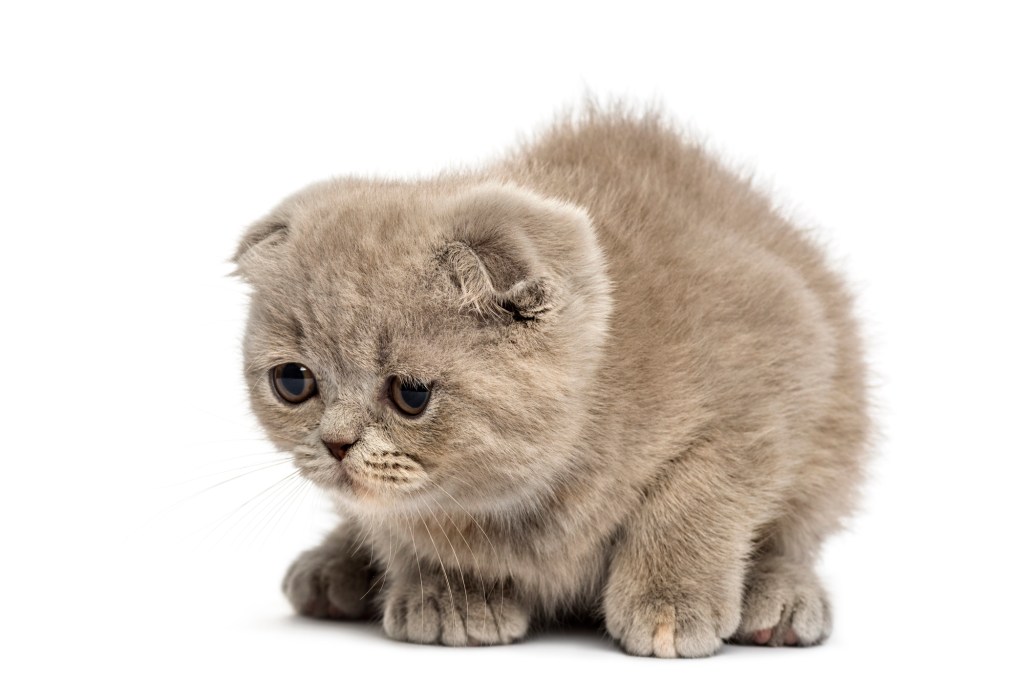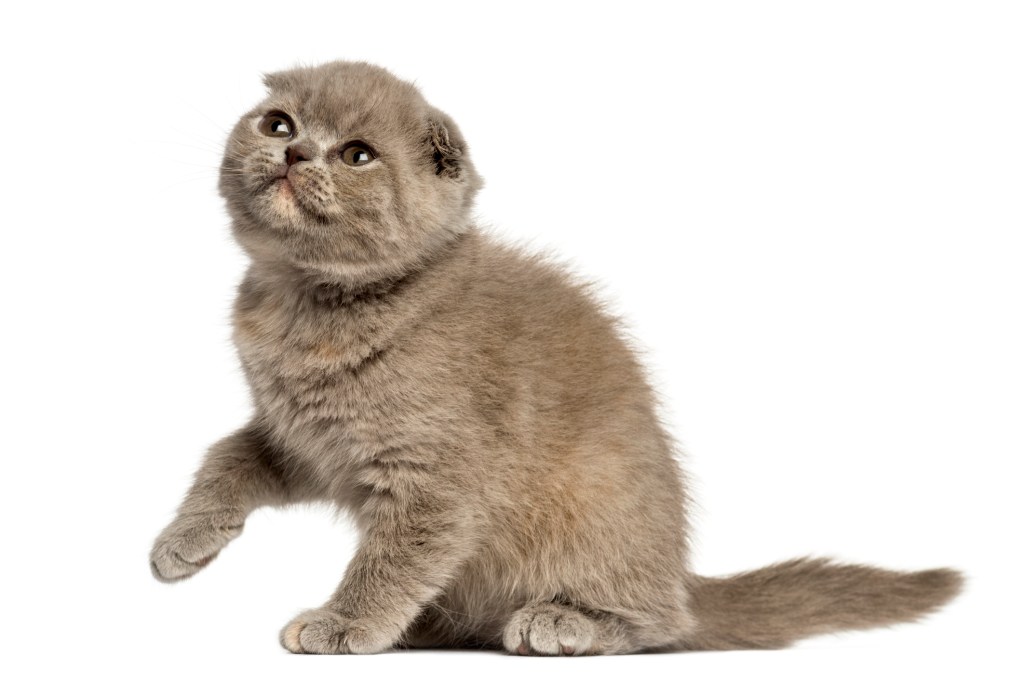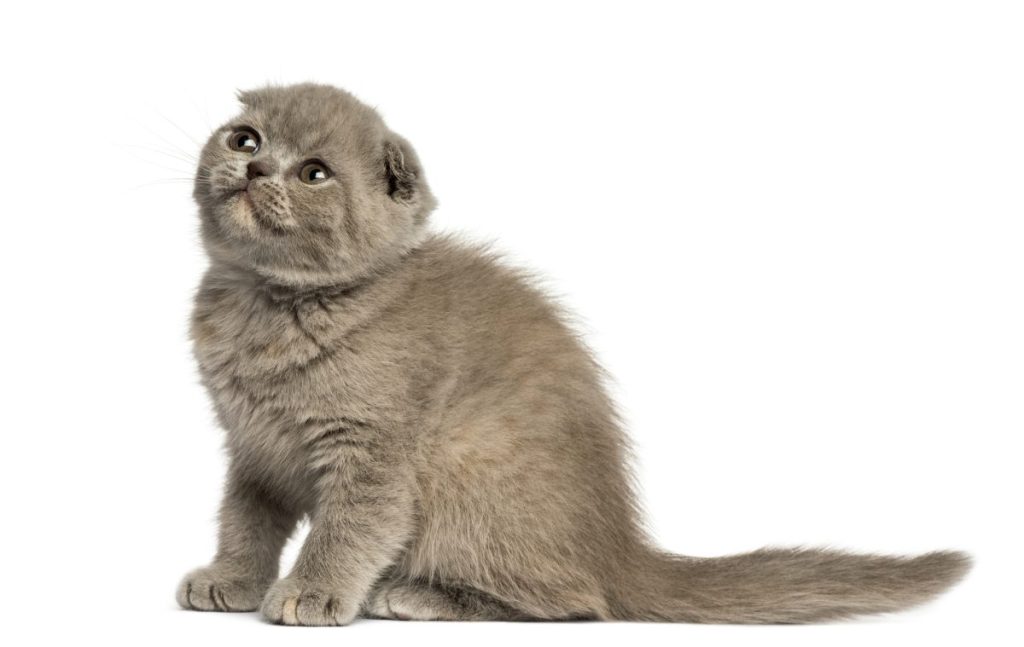Let’s be honest: cat lovers adore a cat that makes them go, “squee!” The Foldex, a Scottish Fold and Exotic Shorthair hybrid, will certainly illicit a case of cute aggression. With their folded ears, rounded features, large eyes, and small face, they are a cartoon come to life. Originating in Canada, this carefully bred, medium-sized kitty combines the charming features of their parent breeds to resemble a cuddly teddy bear. They come in various colors and patterns, as well.
What is the personality of the Foldex cat?
Foldex cats, also known as the Exotic Fold, are gentle and affectionate, and one of the quieter cat breeds. If they had thumbs you might find them completing a crossword puzzle due to their intelligent, independent, and tender demeanor. Their plush fur is easy to groom and lovely to pet as they sit by your side daily.
While their folded ears contribute to their endearing appearance, they also contribute to controversy surrounding the Scottish Fold. The ears are a genetic mutation, and if not properly bred, can be actively harmful to the cat. It’s important to rank health over appearance when choosing your Foldex.
When considering a Foldex kitten, it’s advisable to prioritize adopting from rescue organizations or shelters to provide a loving home to a cat in need. However, if you decide to purchase, it’s crucial to choose a reputable breeder. Conduct thorough research to ensure that the breeder follows ethical practices and prioritizes the well-being of their cats. Reputable Foldex breeders prioritize the health and temperament of their cats, conduct necessary health screenings, and provide a nurturing environment for the kitties. This active approach ensures that you bring home a healthy and happy kitty while discouraging unethical breeding practices.
Quick Facts
- Origin: Quebec, Canada
- Size: Medium
- Breed Group: Longhair
- Lifespan: 12-15 years
- Coat: Long and silky, with a folded ear mutation
- Temperament: Gentle, affectionate, and playful
- Exercise Needs: Low to moderate
- Training: Relatively easy to train
- Grooming: Regular brushing to prevent mats and tangles
- Health: Generally healthy, but can be prone to certain genetic health conditions, such as ear infections and lordosis
- The Foldex is born with straight, unfolded ears. The fold begins to develop around 3-4 weeks of age. The ones that don’t develop folded ears are called “straights.”
- Breeders developed this breed to look like a teddy bear.
Foldex Pictures



-
Affectionate with Family
Some cat breeds are typically independent and aloof, even if they’ve been raised by the same person since kittenhood; others bond closely to one person and are indifferent to everyone else; and some shower the whole family with affection. Breed isn’t the only factor that goes into affection levels; cats who were raised inside a home with people around feel more comfortable with humans and bond more easily.

See Cats Less Affectionate with Family -
Amount of Shedding
If you’re going to share your home with a cat, you’ll need to deal with some level of cat hair on your clothes and in your house. However, shedding does vary among the breeds. If you’re a neatnik, you’ll need to either pick a low-shedding breed or relax your standards. This furniture cover can make it easier to clean up cat hair and keep it off your sofa!
-
General Health
Due to poor breeding practices, some breeds are prone to certain genetic health problems. This doesn’t mean that every cat of that breed will develop those diseases; it just means that they’re at an increased risk. If you’re looking only for purebred cats or kittens, it’s a good idea to find out which genetic illnesses are common to the breed you’re interested in.
-
Potential for Playfulness
Some cats are perpetual kittens—full of energy and mischief—while others are more serious and sedate. Although a playful kitten sounds endearing, consider how many games of chase the mouse-toy you want to play each day, and whether you have kids or other animals who can stand in as playmates. A classic wand cat toy like this one is perfect for playful felines!
-
Tendency to Vocalize
Some breeds sound off more often than others with meows, yowls, and chattering. When choosing a breed, think about how the cat vocalizes and how often. If constant “conversation” drives you crazy, consider a kitty less likely to chat.
-
Kid-Friendly
Being tolerant of children, sturdy enough to handle the heavy-handed pets and hugs they can dish out, and having a nonchalant attitude toward running, screaming youngsters are all traits that make a kid-friendly cat. Our ratings are generalizations, and they’re not a guarantee of how any breed or individual cat will behave; cats from any breed can be good with children based on their past experiences and personality.
-
Friendly Toward Strangers
Stranger-friendly cats will greet guests with a curious glance or a playful approach; others are shy or indifferent, perhaps even hiding under furniture or skedaddling to another room. However, no matter what the breed, a cat who was exposed to lots of different types, ages, sizes, and shapes of people as a kitten will respond better to strangers as an adult.
-
Easy to Groom
Some breeds require very little in the way of grooming; others require regular brushing to stay clean and healthy. Consider whether you have the time and patience for a cat who needs daily brushing. You should definitely pick up this awesome de-shedding tool for cats of any hair length!
-
Intelligence
Some cat breeds are reputed to be smarter than others. But all cats, if deprived the mental stimulation they need, will make their own busy work. Interactive cat toys are a good way to give a cat a brain workout and keep them out of mischief. This scratcher cat toy can keep your smart kitty busy even when you’re not home!
-
Pet Friendly
Friendliness toward other household animals and friendliness toward humans are two completely different things. Some cats are more likely than others to be accepting of other pets in the home.
Foldex History
The history of the Foldex begins in 1992 in Quebec, Canada when they first started popping up on the scene. The breed was a big draw when they began appearing in cat shows due to their super cute looks. A lot of the subsequent development of the Foldex is credited to a breeder named Jeanne Barrette.
The Foldex was officially granted full championship status by the Canadian Cat Association in 2010. These days, you can find Foldexes in shelters or in the care of rescue groups. So make sure to consider adoption if you decide that this is the breed for you!
Foldex Size
The Foldex is a medium-sized cat. As is always the case, exact size standards might vary.
Most Foldexes weigh in at five to 14 pounds. That said, many can be larger or smaller than average.
Foldex Personality
When it comes to the Foldex’s personality, you’ll struggle to come across a more loving and people-friendly cat breed. These are felines who absolutely love cuddle and snuggle sessions with the humans in their life. At times, you might become convinced you’re actually hanging out with a teddy bear as you lounge together on the couch or the bed! It follows that the Foldex is a cat who adores being petted, which also means they bring a soothing presence to the household.
Along with being adorable, the Foldex has a strong inquisitive streak, so make sure to provide smart interactive toys to keep the breed mentally stimulated, along with suitable cat furniture so they can explore and play at their own pace. These sweet felines are also exceptionally approachable, making them a great fit for big families or homes where there’s a large amount of people always coming and going.
Foldex Health
Foldexes are generally considered to be healthy cats; although, they can be predisposed to the same conditions that the Scottish Fold and Exotic Shorthair breeds face. As always, it’s important to schedule regular wellness visits with your cat’s vet. Some of the more common health problems Foldexes suffer from include:
- Skeletal Defects: Osteochondrodysplasia is a genetic disorder that affects the development of cartilage and bone in animals, including cats. In the context of feline health, it’s often associated with breeds that exhibit distinctive physical characteristics, such as short legs or folded ears. The condition results from a mutation that affects the normal growth and formation of bones and cartilage.
- Feline Obesity: Obesity in cats is a common and significant health concern that can have adverse effects on their overall well-being. This condition occurs when a cat consumes more calories than it expends, leading to an excess accumulation of body fat.
- Polycystic Kidney Disease: Polycystic Kidney Disease (PKD) is a genetic disorder that affects the kidneys in cats. It is an inherited condition characterized by the development of fluid-filled cysts within the kidneys. PKD is most commonly associated with certain cat breeds, notably the Persian and related breeds, although it can occur in mixed-breed cats as well.
Foldex Care
As with all cats, it’s important to keep up your Foldex’s regular veterinary checkups to detect any health concerns early. Your vet can help you develop a care routine that will keep your cat healthy.
Beyond scheduling yearly wellness visits with your vet, you’ll want to add a scratching post to your Foldex’s living environment. This can help promote healthy scratching and keep the cat’s nails in good condition.
The Foldex’s ears should also be examined regularly for signs of dirt building up or possible infection. It’s advisable to talk with your vet about starting a regular teeth brushing regimen that will suit your Foldex. Your vet can advise you about specific brands and techniques. While the Foldex has a sweet and laid back personality, it’s also important to make sure that there is enough space for the breed to play and exercise, so consider adding a cat tree to your home.
Foldex Coat Color And Grooming
The Foldex is a breed of cat that you’ll see in almost every cat color available, and in patterns that include tabby and calico. When it comes to grooming, this will totally depend on whether your Foldex is a long or short haired kitty.
If you have a short haired Foldex, brushing their coat once a week should suffice. But a long haired Foldex will require more frequent brushing to help lessen the chances of hairballs and mats forming. Aim for every other day–although the breed will happily take to daily brushing sessions.
In terms of climate, the Foldex is generally an adaptable breed of cat. Although you should always make sure that there’s enough shade and fresh water available during the hotter months.
Children And Other Pets
The Foldex is a friendly feline who does very well with young children. Just be sure that early socialization takes place and boundaries are properly set on both sides, and supervise early interactions between kids and cats. When it comes to other household pets, the Foldex fares well with many domestic animals, including dogs. Always supervise early interactions between the new cat and existing pets. Ultimately, early socialization really pays off with this breed. Make sure to reward your Foldex for good behavior when you bring them home to your family!
Foldex Rescue Groups
It may be hard to find a breed specific rescue for Foldexes because they are a mixed breed. However, you may want to try shelters and rescues that cater to all types of cats, including Foldexes, as well as your local shelter. Here are some nonprofit rescues you can try:
More Info For You
If you’re also looking for a dog, check out DogTime’s dog breed page!





